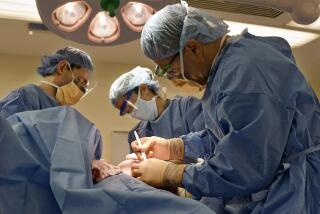Unnecessary Cuts : Heart Bypass Surgery Often Not Needed or Questionable, Study of 3 Hospitals Says
- Share via
Heart bypass surgery is often performed unnecessarily or in situations when the benefits and risks of the operation appear to be roughly equal, RAND Corp. researchers reported today.
The authors of the new study said it affirms earlier research about the extent of unnecessary medical and surgical treatments. It also emphasizes the need for patients to question their doctors closely and seek second opinions, the authors said.
The detailed review of 386 case histories, being published in the Journal of the American Medical Assn., rated 14% of the surgeries “inappropriate” and said an additional 30% were performed for “equivocal” reasons. Only 56% of the operations were clearly “appropriate,” the researchers said.
“We are not picking on surgeons or cardiovascular surgeons,” said Dr. Robert H. Brook, a physician trained in internal medicine and the senior author of the study. “We have found significant overuse with every procedure we have studied.”
A nine-member panel of expert physicians in 1984 developed the ratings of “necessary” and “unnecessary” care based on detailed reviews of existing medical knowledge. The panel also developed a list of 488 symptoms meant to cover all possible reasons for performing the surgery.
In an interview, Brook acknowledged that the conclusions may not be “generalizable” to all hospitals because they are based on an analysis of only three facilities in a Western state. Neither the three hospitals nor the state were identified.
In addition, the surgeries, which were performed in 1979, 1980 and 1982, may not reflect current medical practice.
Dr. Jack Copeland, a University of Arizona heart surgeon who heads the school’s nationally known heart transplant program, told the Associated Press, “I’m not aware of too many instances where there has been an abuse of this kind of surgery.
“I don’t doubt there are some abuses, but I would doubt that it’s as significant” as the study suggests, he added.
But Brook said the findings underscored the need for “a system to monitor appropriateness of care” so that patients could be “guaranteed” that medical procedures and surgeries were being recommended for sound reasons.
“If there is controversy, their physician ought to tell them that,” he said.
At one of three hospitals, 63% of the bypass surgeries were judged either inappropriate or equivocal and only 37% appropriate. But at another hospital, 78% were judged appropriate and only 22% inappropriate or equivocal.
Heart bypass surgery is an expensive and technically complex operation that is performed about 200,000 times a year in the United States. Surgeons restore an adequate blood supply to the heart by grafting blood vessels from elsewhere in the body around blockages in the arteries supplying blood to the heart. The overall mortality rate is about 5%.
In certain situations, most cardiologists and cardiac surgeons agree that the operation is necessary to prolong life or to relieve intractable angina, the chest pain caused by an inadequate blood supply to the heart.
In other instances, however, alternate treatments such as angioplasty and medications that can relieve angina may provide a patient with a similar or greater benefit. These alternate treatments may be less risky and costly. (Angioplasty is a procedure performed by cardiologists in which clogged heart arteries are opened with a balloon-tipped hollow tube inserted through the skin and threaded through a vein to the heart.)
According to the RAND study, inappropriate surgeries frequently involved instances where blockages jeopardized the blood supply to only a limited amount of heart tissue and the patients had not been given “an adequate trial of medical therapy.”
The most frequent equivocal situations involved patients with more extensive blockages but mild angina symptoms who were receiving “less than maximal” medical therapy.
Last November, the RAND researchers published a review of thousands of case histories in the same medical journal that they said documented excessive use of three other procedures. They are carotid endarterectomy, the surgical removal of blockages in the main arteries to the brain, coronary angiography, an X-ray technique in which a tube is inserted into the heart arteries and die injected through it, and upper gastrointestinal tract endoscopy, an examination of the digestive organs with a fiber-optic lighted tube.






